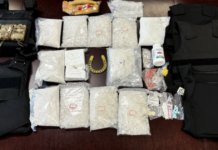A man who viciously murdered an Indigenous woman in Saskatoon is now back in custody in Victoria, B.C. with suspended parole, according to Chek News.
Victoria police have not given any public details as to why the arrest was made, but they have confirmed that they arrested Kenneth MacKay, 49, on Friday.
In 2000, MacKay was found guilty of first-degree murder for killing Crystal Paskemin, a 21-year-old woman he’d met at a local bar in Saskatoon, Saskatchewan.
MacKay was given an automatic life sentence of 25 years without parole.
In January, MacKay was granted day parole by the Parole Board of Canada and in July, it was extended for an additional six months.
The Correctional Service of Canada advised against the decision, saying that MacKay was considered to be a high risk for violent reoffending by his case management team. They believed he needed a much more gradual release.
“There continue to be concerns regarding power and control issues and possible issues with women,” said the decision.
Part of MacKay’s parole conditions were that he return to a residential facility every night on Vancouver Island and report all of his sexual and non-sexuual relationshops with women. He also could not travel to Saskatchewan without permission and could not have any contact with the Paskemin’s family.
Correctional Service Canada is responsible for custody and supervision of offenders who are living in the community on parole.
“If an offender on parole fails to abide by conditions imposed, their release may be suspended by the (Correctional Service Canada) and they will be returned to prison,” said Lisa Saether, a regional manager with the parole board.
Saether said she could not discuss the specifics of MacKay’s arrest at this time.
Paskemin was from Sweetgrass First Nation and her family spoke highly of her warm character. Paskemin’s family spoke out when MacKay was set to be released, saying that they believed he was still a threat to women.
“We pray that no family must go through the hell on earth that we have had to navigate, through the darkest depths of evil, at the hands of this murderer,” wrote the family in a statement in February.
Mackay had met Paskemin at a bar in Saskatoon and afterwards, he offered her a ride home. Instead, he drove her out to an isolated road outside of the city where he sexually and physically assaulted her before running her over with his truck. MacKay then set her body on fire.
According to the parole board, it had not been until recently that MacKay had admitted any culpability in the murder and he “appeared to show no emotion” when talking about his actions.
MacKay’s recent arrest prompted the Federation of Sovereign Indigenous Nations, a group which represents 74 First Nations in Saskatchewan to call for a change in laws around parole.
In a statement released on Wednesday, the federation said that the parole board was facing problems of credibility when it comes to First Nations people and that a change must occur in order to restore faith amongst them.
“Killers who inflict such devastating harm on First Nations women are unfit to be part of society,” said the statement. “Killer Kenneth MacKay has violated the basic principles of human dignity and justice, and he has forfeited his right to belong to a civilized community.”





















